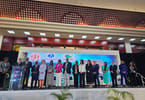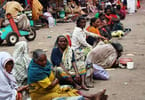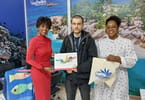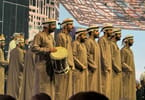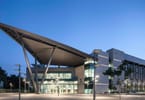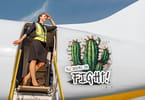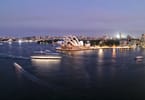East Africa correspondent Prof. Dr. Wolfgang H. Thome sat down with Zambian President Rupiah Banda at the recently held Munyonyo Commonwealth Resort for an hour-long interview about Zambia’s tourism industry.
eTN: May I first thank you, Mr. President, for making time available to speak with eTN about the tourism industry in Zambia. Your country hosted the last Smart Partnership Dialogue a year ago, what impact did that meeting have and what changes have taken place or are taking root in Zambia as a result?
President Rupiah Banda: Indeed the last Smart Partnership was held in Zambia a year ago. Since then we held a number of conferences, including an ‘Indaba’ which means broadly translated a “congress of people” to discuss smart solutions to the economic problems faced by Zambia. Over 600 people attended, including speakers from Mauritius and Malaysia, and the President of the World Bank, and it produced a good outcome. Other follow up meetings saw fellow heads of state come to Zambia to discuss specifically infrastructure and to reduce what I call fragmentation between our countries in the region. We looked at roads, electricity grids, border facilities and management. For this meeting we also welcomed our development partners and friends from abroad, including the USA, the EU countries and others. The outcome was a pledge exceeding US$1 billion in development support to address the need to strengthen infrastructure linking our countries. As a government we have also already passed a number of enabling bills, including an ICT Bill, to expand investment in the sector and move from state control towards private enterprise. We don’t like to continue subsidizing loss making state enterprises and are therefore looking towards partnerships with the private sector.
çeTN: What in your opinion makes Zambia a unique tourism destination?
President Banda: Zambia is very unique in as far as its location is concerned. We are landlocked and have eight neighbors, so when people talk about a “hub,” Zambia really is one. This geographical position, endowed with plenty of resources. This is true for the minerals, of which almost every major mineral is found and mined in Zambia, except for oil, but we are still looking for investors in that sector too. Also our natural attractions, large tracts of almost untouched land, including many game parks, with only over 11 million people living in our country. We have enough rainfall to sustain agriculture, and visitors can find many lakes and rivers in our country. Most important, our biggest attraction is the Victoria Falls most of which is located in Zambia. We have already 19 game parks and more game than most African countries including the “big five.” Law protects wild animals, so people coming to Zambia can see leopard, lion, buffalo, giraffes, elephants, hippos, and crocodiles without problems. And very important, we have peace in our country, visitors can go anywhere without special protection and would not find themselves in any danger.
eTN: With all these attractions, what prevents more tourists from visiting Zambia, is it lack of enough flights to Lusaka, is it visa fees, the cost of park entrance fees, bureaucracy and cost at the borders, lack of marketing? Here in East Africa our governments have slashed visa fees and park entrance fees to attract more tourists, what is the Zambian solution.
President Banda: What we are doing is to address the lack of knowledge in the world about Zambia and are trying to create more world-class tourist facilities. For instance, we have Victoria Falls, but few people know that we may have even a thousand waterfalls in the country. Our rivers and lakes are full of fish which might entice visitors, our country offers photographic safaris but also hunting. We have organized our vast areas in such a way, that we have game parks, where there is no hunting or any other disturbance allowed to protect the animals, and then we also have hunting areas or GMA’s (game management areas) for those who come to hunt animals.
It is a lack of good marketing that has not brought more visitors to Zambia, so many people abroad do not know enough about Zambia and its attractions. We are a big country with over 700,000 square kilometers of area and tourists are welcome to discover all parts of Zambia. But for that we also need facilities everywhere. My government is now in place for only 8 months and we are paying attention to this aspect, lodges, hotels, and airports even in the most remote areas. But even border issues have received our attention; we are going to streamline these formalities because we need tourist more than they need us. We want our people to be smiling and welcoming. In regard of fees, we have already started reducing these fees. We rather have you come to our country and spend your money in the country instead of spending it on fees at the border.
eTN: Is tourism, an economic priority sector for your government, and if yes, what investment incentives and policies has your government put into place to promote equitable participation of Zambians in the development of the sector, besides attracting Foreign Direct Investment?
President Banda: We are moving generally towards private public partnerships, encouraging investment from abroad and from within Zambia. Many Zambians cannot put up world class facilities with their present resources, so we encouraged them to partner with those who can, but also created an empowerment fund worth over 150 billion kwacha (US$29.5 million), which Zambians can access to get seed funding for such projects like small lodges. And when big international companies are setting up resorts and hotels, that is also good for our country, because there is attention to such investments and people take notice of Zambia. We welcome tourists also for their ability to create networking for our people in Zambia, like when they go on safari with their guides, they make friends, some are invited and sponsored to study abroad, some set up companies together, so tourism is a way to open up a country in such a way that it can bring big benefits.
eTN: Does the Zambia Tourist Board do enough to promote the country abroad, and most important, do they have the necessary budget to fulfill their functions?
President Banda: Our tourist board understands what must be done, but obviously the budget is never enough, especially during difficult economic times like now. But nevertheless, we have increased funding for tourism, because we realized that it is a good alternative to for instance mining and other sectors.
eTN: Next year, the FIFA World Cup is coming to Africa for the first time ever. How does Zambia intend to benefit from her vicinity to South Africa and attract tourists to see the Victoria Falls and the game parks prior and after the big event?
President Banda: to be honest, physical preparations like building stadia, that has not taken place, so we are not likely to invite teams to stay with us and train in Zambia. But for tourists, they can easily come from South Africa and visit us. It is only a 90-minute flight from Johannesburg to Livingstone, so visitors to the World Cup can take a day or two and fly to see the falls, or even stay a little longer, and we have already very good hotels, lodges and resorts in Livingstone for our international visitors and more are being built or planned for every area where tourist may want to go and visit.
eTN: Here in East Africa we are trying to establish a single Visa zone for tourists to make visits more affordable, how does Zambia view such an effort within SADC and in particular her immediate neighbors, all of which are also tourism destinations?
President Banda: That is true, Visa are still a problem but our regional bodies like SADC (Southern Africa Development Community) and EAC (East African Community) and COMESA (Common Market for Eastern and Southern Africa) are working on this problem to come up with a solution. We should make it easier for visitors to come and see more than one country in a region and not spend a lot of money for visa. All our neighbors have a tourism industry and together we can improve a lot of our infrastructure and provide better services for visitors.
eTN: The type of wildlife based tourism many African countries promote obviously needs sizeable game numbers. We often hear about a poaching problem in parts of Southern Africa, notably Zimbabwe but apparently also Zambia. What is the policy of your government to encourage wildlife conservation, halt poaching and create sustainable solutions for the challenges arising from growing human populations and the need of co-existence of conservation and economic development needs, humans and wildlife?
President Banda: Yes, poaching is still a big issue in some areas but we have strong laws and can make them stronger if needed. We are committed to protect our wildlife in the game parks and when we find people poaching, they are punished. But you also need to remember, Zambia was the home for all the liberation movements in all of Southern Africa and because of some of the materials left behind and the way people did things then, we have a bit of a problem, but we are firm to deal with it and protect wild game as much as we can.
eTN: I have read that your wildlife management body ZAWA has been almost over generous to concession out large tracts of the parks to big investors; is that part of government policy and what opportunities exist or are created for ordinary Zambians to tap into this business potential to allow small and medium sized businesses to also prosper?
President Banda: In Zambia we want opportunities for Zambians and also for foreign investors. My government is determined to offer opportunities for private investments at all levels and also in all corners of the country. There are many parks with almost no facilities and that has to change if we want to get more tourists to visit.
eTN: To follow on ZAWA if I may, indigenous tourism stakeholders in Zambia seem to have a somewhat rocky relationship with them, over tariff increases, lack of infrastructural developments inside and outside the parks, over the concession spree for big international consortia. What course of action is your government taking to maximize benefits for Zambians, Zambia’s economy and long term sustainability?
President Banda: We talked already about the empowerment fund available for Zambians and then there are other partnerships possible and available between business people directly and even through public private partnerships. We as a government are committed to bring development even in the tourism sector.
eTN: President Museveni during his opening address made it plain that without an intact infrastructure all efforts to attract investments for industrialization are almost in vain. Here in Uganda we have for the past two years embarked on a major policy revision in regard of road and rail rehabilitation and power generation. How does your government approach this critical issue, after all without good roads tourists are hardly able to get to the game parks?
President Banda: This is a big challenge for many countries including Zambia but we have started with a road program and are going to do a lot more. There is also the issue of power plants and power grids, which we are addressing as a region and we are also working on airports and airfields in other parts of the country to either upgrade or build so that we can have tourists and our own people move easily from one part of Zambia to the other. Then visitors can choose to either drive or fly or both, whatever is convenient for them.
eTN: There is a saying, “tourism is peace and peace is tourism,” there has been strife in Zimbabwe for too long and a previously prosperous tourism industry has nearly collapsed. This must have affected Zambia too. How is your government dealing with this crucial regional issue to kick start tourism and maximize the employment and foreign exchange earnings potential for Zambia and her neighbors?
President Banda: Any problems in your neighborhood also affect you. We have been trying to find a solution for such problems from within the region because external solutions are not really suitable, solutions need to be welcomed and embraced by those affected and concerned. We are happy in Zambia to see progress being made towards that end because a prospering region brings benefits for everybody. As to Zambia, we are thankfully living in peace and wish to see every country around us to also live in peace. You asked about tourism in Zimbabwe and when there are no tourist coming there we too are not seeing them. So a good tourism performance in Zimbabwe and any of our neighbors will be good for Zambia too, and I hear things are picking up again which is positive and a sign that regional help has succeeded.
eTN: Coming near the end, in my own various capacities human resource development, skills transfer and career building is a corner stone in my professional life, what role do these components play in Zambia, do you have a hospitality and tourism training college, vocational training schemes and career advancement programs to create employment for young Zambians wishing to enter the tourism sector?
President Banda: This is a real challenge still for Zambia, we need to do more about vocational training, training facilities, colleges etc. We know about Utalii’s success in Kenya and we really need similar institutions to train our young people. They need to learn their vocations and trades to be able to compare with standards in other countries around us, and be able to even work abroad as expatriates. I hear many Kenyans and even Ugandans now work abroad after getting good training at home first, so that is an important priority for us in Zambia. We can readily accept assistance from our friends in the region and further abroad because good training and skills give our young people an opportunity to find good work and build careers. You said you are chairman of the Ugandan hotel school, so any assistance will be welcome and we are open to facilitate such help and opportunities on behalf of our young people. Sending them abroad for training can only be for a few, so we aspire to create capacity within Zambia to meet those training needs.
eTN: Finally, will all the positive components, action plans and interventions you have talked about be in place ahead of the FIFA World Cup to bear active fruits for Zambia and herald in the changes many in your country’s tourism private sector have been waiting for?
President Banda: As I said before, we are not going to have stadia for foreign teams but we have many attractions and expect many visitors to come visit Victoria Falls before, during and after the world cup. Our tourist board will work towards making Zambia better known so that we can take advantage with the facilities we already have in place, hotels, safari lodges and resorts. About all other things we talked about, my government is moving as fast as we can, but things do not happen just overnight, infrastructure takes time to plan and build. For football fans coming to South Africa, they are welcome to visit Zambia too and generally we look forward to our tourism industry opening up more and bringing more visitors to our country.
WHAT TO TAKE AWAY FROM THIS ARTICLE:
- We have organized our vast areas in such a way, that we have game parks, where there is no hunting or any other disturbance allowed to protect the animals, and then we also have hunting areas or GMA's (game management areas) for those who come to hunt animals.
- As a government we have also already passed a number of enabling bills, including an ICT Bill, to expand investment in the sector and move from state control towards private enterprise.
- With all these attractions, what prevents more tourists from visiting Zambia, is it lack of enough flights to Lusaka, is it visa fees, the cost of park entrance fees, bureaucracy and cost at the borders, lack of marketing.



